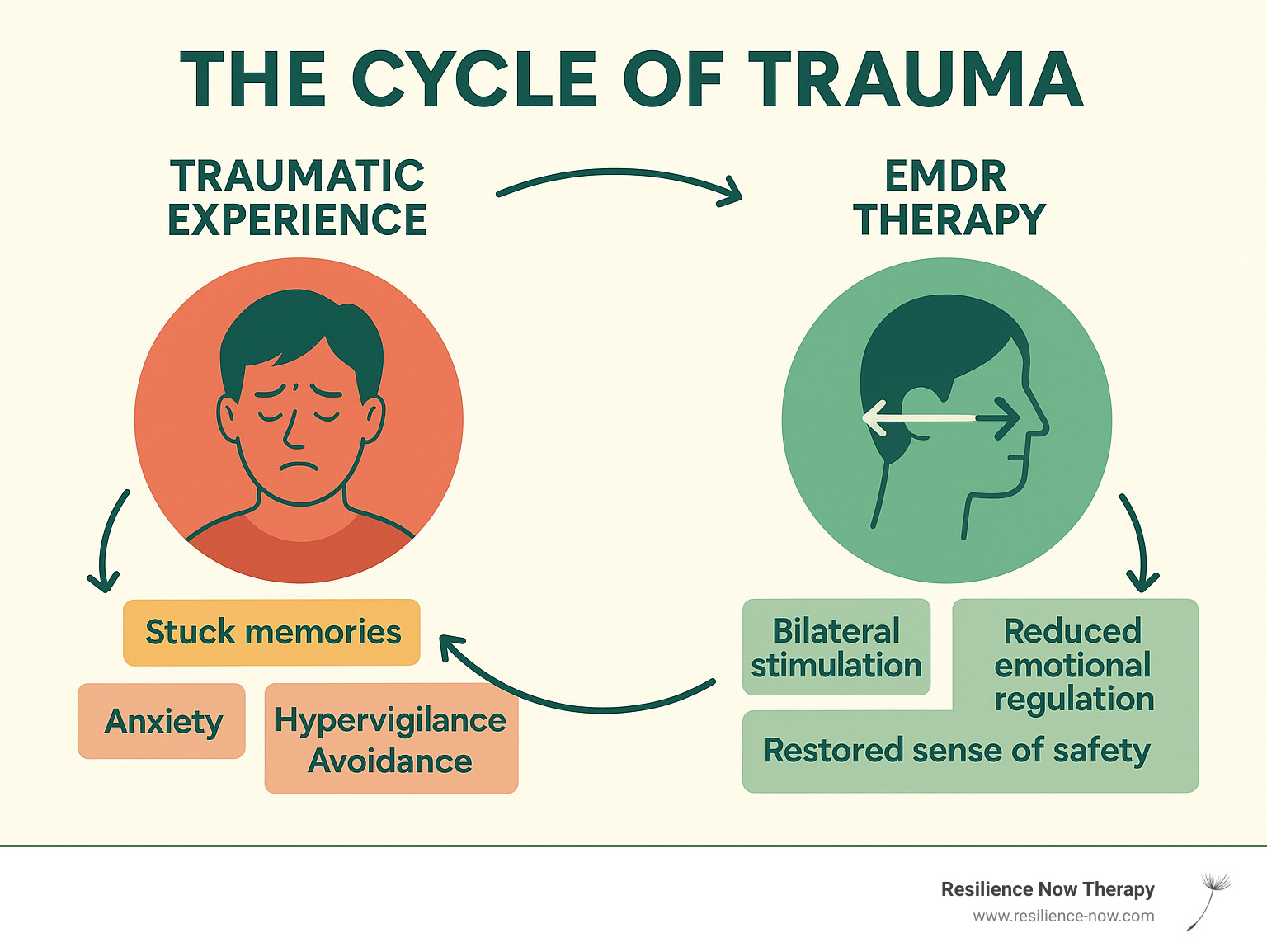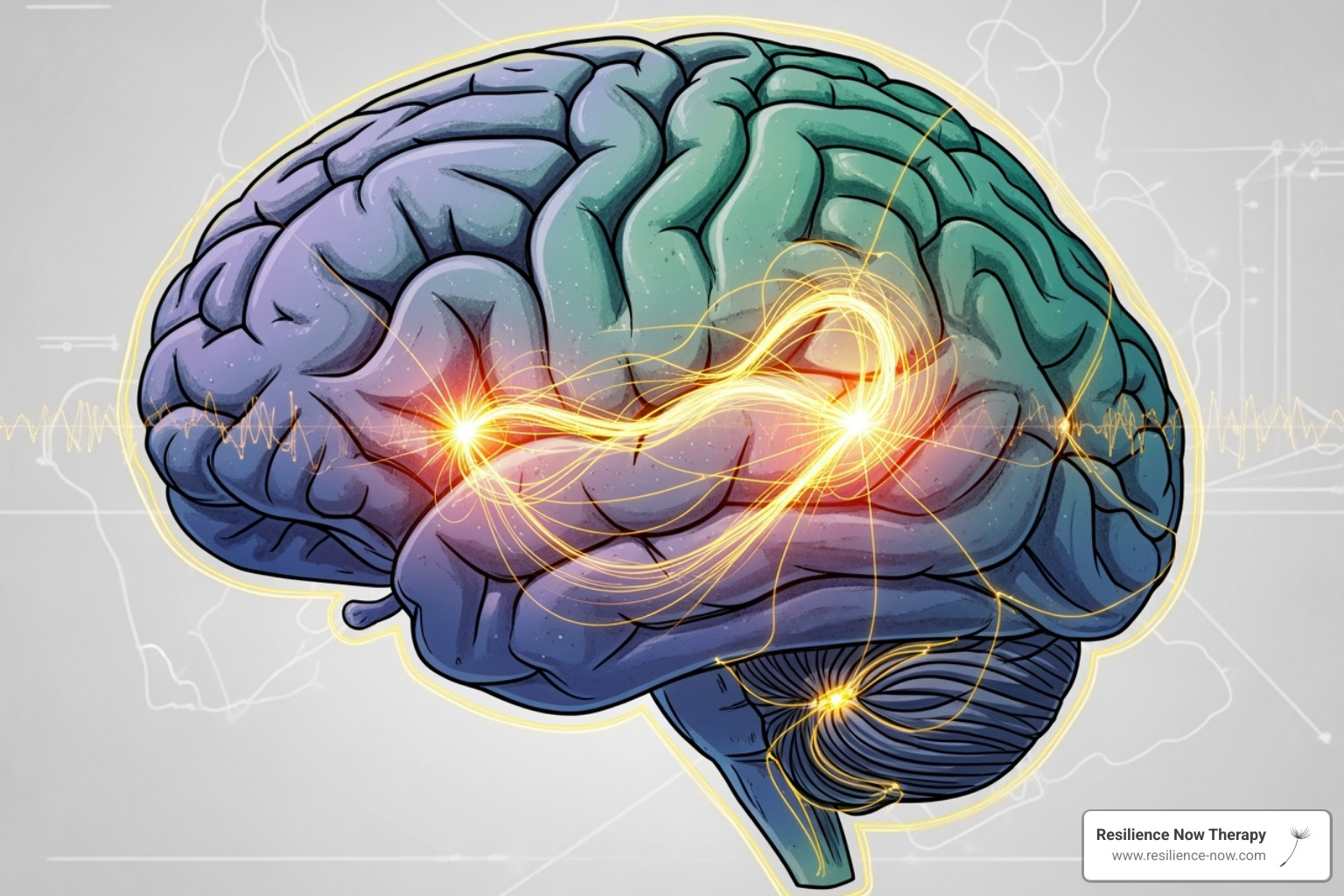EMDR Treatment Calgary: Transformative Therapy for Trauma and Anxiety

Understanding EMDR Treatment Calgary: A Path to Healing
If you're seeking EMDR treatment Calgary, you're looking for a powerful reprocessing therapy approach that can help you heal from trauma and anxiety without requiring you to relive painful experiences in extensive detail. As a Licensed Therapist and Certified EMDR Therapist, I specialize in providing compassionate, evidence-based EMDR trauma therapy for women who are ready to transform their relationship with past experiences and find genuine relief from emotional distress.
My practice at Resilience Counselling and Consulting, takes a holistic approach, addressing mind, body, and emotional well-being to support comprehensive healing and overall wellness. I understand that each woman's journey is unique, which is why I tailor every aspect of treatment to meet your individual needs and circumstances.
What is EMDR Therapy?
Eye Movement Desensitization and Reprocessing (EMDR) is a specialized reprocessing therapy approach that helps your brain process traumatic memories and heal from adverse life experiences. This powerful form of treatment utilizes eye movement desensitization and reprocessing techniques to help your brain naturally reprocess distressing memories and reduce their emotional impact.
EMDR uses bilateral stimulation—typically guided eye movements—to help your brain naturally reprocess stuck traumatic memories. This approach directly targets the way disturbing memories are stored in your nervous system, allowing for profound healing without requiring extensive verbal processing that traditional therapies might demand.
Key aspects of EMDR include:
Bilateral stimulation: Uses eye movements, sounds, or tactile stimulation to activate your brain's natural healing process
Reprocessing traumatic memories: Helps transform how distressing memories are stored and experienced
Rapid relief: Many clients experience significant improvement within the first few EMDR sessions
Evidence-based: Recommended by the World Health Organization as a first-line treatment for post traumatic stress disorder and trauma
Minimal verbal processing: Doesn't require extensive discussion of traumatic details unlike traditional talk therapy approaches
When you experience traumatic events or other adverse life experiences, your brain can become stuck processing these memories, leading to ongoing psychological distress and mental health concerns. EMDR helps your brain heal from trauma much like your body heals from a physical wound—once the block is removed, natural healing can resume.
Research demonstrates that this effective treatment can be up to 90% effective in reducing post traumatic stress disorder symptoms, making it one of the most powerful tools available for trauma recovery and anxiety treatment. This approach has helped millions of people worldwide find emotional freedom from the grip of past traumas.

The Science Behind EMDR: How Eye Movement Desensitization and Reprocessing Works
Eye movement desensitization and reprocessing is grounded in the Adaptive Information Processing (AIP) model, which suggests that psychological distress often stems from unprocessed traumatic memories. When traumatic events occur, the memory can become "stuck" in your nervous system, retaining the original emotional intensity and physical sensations.
The Brain's Response to Trauma
During traumatic experiences, your brain's alarm system (the amygdala) becomes hyperactivated while the thinking part of your brain (the prefrontal cortex) goes offline. This is why traumatic memories can feel so vivid and continue to trigger intense "fight, flight, or freeze" responses long after the original event.
These unprocessed distressing memories can manifest as:
Intrusive thoughts, flashbacks, and disturbing images
Intense emotional reactions to triggers
Physical sensations and psychological stress
Avoidance behaviors and distressing emotions
Hypervigilance and anxiety disorders
Sleep disturbances and nightmares
How EMDR Facilitates Healing
EMDR uses bilateral movements—such as rapid eye movements, alternating sounds, or tactile stimulation—to help calm the amygdala while re-engaging the prefrontal cortex. This allows distressing memories to be processed in a healthy, integrated way through movement desensitization and reprocessing. Through a process called memory reconsolidation, the traumatic memory is updated so it becomes less emotionally charged and overwhelming.
The bilateral stimulation in this reprocessing therapy mimics the natural rapid eye movements that occur during REM sleep, when your brain naturally processes daily experiences. This helps activate your brain's innate healing mechanisms and allows stuck memories to be properly integrated into your life story, promoting emotional well being and mental health recovery.
The Structured Eight Phase Treatment Process
My approach to EMDR in Calgary follows a carefully structured eight phase treatment process designed to ensure your safety, comfort, and therapeutic progress. Each EMDR session follows this structured approach, with each phase tailored to your individual needs for comprehensive and methodical treatment.
Phase 1: History and Treatment Planning
I begin by understanding your unique history, identifying your presenting concerns, and collaborating with you to establish clear treatment goals. This personalized approach ensures that your EMDR treatment is tailored to your specific needs and circumstances. I take special care to understand how your experiences as a high-achieving woman may have shaped your current challenges.
Phase 2: Preparation
Before beginning memory processing, I focus on building a strong therapeutic relationship and teaching you effective coping strategies for emotional regulation. These skills help you manage distressing emotions during sessions and provide resources for between-session support. I understand that many of my clients are used to being the strong one for others, so I ensure you have robust tools for self-care.
Phase 3: Assessment
Together, we identify specific traumatic memories to target, along with the negative beliefs these experiences created about yourself. Self esteem issues are commonly identified and addressed during this phase, as they often arise from these negative beliefs. We also work to identify positive beliefs you'd like to develop and strengthen, particularly those that support your authentic self-worth beyond external achievements.
Phase 4: Desensitization
While you focus on the target memory, I guide you through bilateral stimulation using eye movements. Your brain naturally processes the memory during this phase, reducing its emotional intensity and distressing impact through reprocessing traumatic memories. This phase also helps process and reduce negative emotions associated with traumatic memories.
Phase 5: Installation
This phase focuses on strengthening positive beliefs about yourself and connecting them to the processed memory during the installation phase. This helps build a more resilient and empowered sense of self while addressing negative beliefs that may have driven perfectionism or people-pleasing patterns.
Phase 6: Body Scan
I guide you through checking for any remaining physical sensations or tension related to the memory. Any lingering physical responses are processed until you feel calm and centered. This is particularly important for women whose bodies may hold stress from years of overgiving and overwhelm.
Phase 7: Closure
Each session ends with ensuring you feel grounded and stable. I remind you of your coping strategies and provide additional support if needed.
Phase 8: Re-evaluation
In subsequent sessions, I check on previously processed memories to ensure the positive changes have been maintained and address any new material that may have emerged.
This structured approach ensures that your treatment is both safe and effective, allowing for deep healing while maintaining your emotional well being throughout the process.

Specialized Focus: Supporting Women
My practice specializes in working with women who appear successful and put-together externally but struggle internally with high-functioning anxiety, emotional pain, racing thoughts, and self doubt. I understand the unique challenges faced by women in helping professions such as nursing, teaching, and social work, as well as those in high-stress careers who exhibit perfectionism, imposter syndrome, and people-pleasing tendencies.
If you're juggling numerous responsibilities while battling patterns of overthinking, overgiving, and putting others first, you may find that chronic stress is affecting your physical health, disconnecting you from meaningful relationships, and leading to burnout despite your professional achievements. Perhaps a recent crisis—such as a health diagnosis, relationship breakdown, or traumatic incident—has finally motivated you to seek deeper help.
I provide a space where you can explore how your past experiences connect to present patterns using evidence-based approaches like EMDR and Accelerated Resolution Therapy. My goal is to provide practical tools to regulate your nervous system and help you transform your relationship with yourself, moving beyond coping mechanisms to genuine healing.
Conditions and Symptoms I Treat with EMDR
My EMDR practice in Calgary specializes in helping women overcome a wide range of trauma related symptoms and mental health concerns. While EMDR is renowned for treating major traumatic events, it can effectively treat experiences that may seem "ordinary" but have left you feeling stuck or overwhelmed.
Trauma-Related Conditions:
Post traumatic stress disorder (PTSD)
Complex post traumatic stress disorder (C-PTSD)
Childhood trauma and adverse life experiences
Single-incident trauma (accidents, medical procedures, etc.)
Developmental trauma and past traumas
Attachment injuries and relationship trauma
Anxiety Disorders:
Generalized anxiety disorder
Panic attacks and panic disorder
Social anxiety and performance anxiety
Specific phobias - EMDR can effectively treat various phobias by processing the underlying fear memories
Health anxiety and excessive worry
Additional Mental Health Concerns:
Depression, particularly when linked to unresolved past traumas
Chronic psychological stress and overwhelm
Grief and loss processing
Life transitions and adjustment difficulties
Relationship issues rooted in past experiences
Low self esteem and negative beliefs
Guilt, shame, and emotional pain
Chronic pain with psychological components
Eating disorders with trauma connections
Many of my clients are surprised to discover how this effective treatment can address issues they didn't initially recognize as trauma-related. The approach is particularly beneficial for high-functioning individuals who appear successful externally but struggle with internal emotional distress and disturbing emotions.
My Comprehensive Treatment Approach
Beyond EMDR, I integrate several evidence-based approaches to provide comprehensive care tailored to your unique needs. While other therapies like cognitive behavioural therapy focus primarily on changing thought patterns, my approach addresses the deeper neurological and somatic aspects of trauma:
Accelerated Resolution Therapy (ART): A rapid approach that combines elements of EMDR with other evidence-based techniques for accelerated healing
Internal Family Systems Informed Therapy: Helps you understand and heal different parts of yourself, particularly valuable for addressing perfectionism and people-pleasing patterns
Trauma-Informed Stabilization Treatment: Focuses on strengthening the mindful self and increasing nervous system regulation by helping you respond to trauma-driven parts with curiosity and calm
Observed and Experiential Integration Therapy: Uses eye position-based interventions to access and process emotional and somatic experience, enhancing body awareness and present-moment connection.
Parts Work: Explores the different aspects of your internal experience to promote internal regulation and self-compassion
This integrated approach ensures that your treatment addresses not just symptoms but the underlying patterns and beliefs that may be keeping you stuck. Each treatment plan is carefully crafted to honor your individual circumstances, goals, and timeline.
The EMDR Process: What to Expect from Your Sessions
Beginning EMDR therapy in Calgary can feel both exciting and a bit daunting . My priority is creating a safe, supportive environment where you can explore your experiences at your own pace. I believe that the therapeutic relationship is the foundation of all healing, and I work collaboratively with you throughout the entire process.
Your Treatment Journey:
Initial Consultation: I offer a free 15-minute phone consultation where we can discuss your concerns and determine if EMDR is right for you. This allows you to get a sense of my approach and ask any questions you might have.
Intake Session: Your first appointment is a comprehensive 50-minute intake session. This guided conversation helps me understand your history, current challenges, and treatment goals. I'll also explain the EMDR process in detail and address any concerns.
Preparation and Skill Building: Before beginning memory processing, I ensure you have effective coping strategies and emotional regulation skills. This preparation phase is crucial for your safety and success throughout treatment.
Active Processing: During EMDR sessions, you remain fully conscious and in control. I guide you gently through the bilateral stimulation using eye movements while you process targeted memories. Many clients describe feeling both challenged and supported during this phase.
Integration and Stabilization: After processing sessions, I help you integrate your new insights and strengthen positive beliefs about yourself. This phase is essential for maintaining your progress and building resilience.
Session Structure and Frequency:
EMDR sessions typically last 50 to 90 minutes, depending on your needs and the complexity of the material we're addressing. I schedule sessions on a weekly or biweekly basis, with consistent attendance being particularly important when doing deep trauma treatment work.
The number of sessions needed varies significantly based on your individual history and goals. For single-incident trauma, resolution often occurs within 3 to 8 sessions. For more complex childhood trauma or multiple traumatic experiences, treatment may extend to 12 to 20 sessions or more. I always work at your pace and regularly check in about your progress and comfort level.
Many clients notice significant improvement within the first 1 to 3 sessions, which can be remarkably transformative. Once a memory is successfully processed, the relief is typically permanent, making the changes you experience lasting and meaningful.
EMDR Intensives and Accelerated Healing Options
For clients seeking more concentrated treatment, I offer EMDR intensives that allow for deeper processing and can significantly accelerate your healing timeline while respecting your busy schedule.
EMDR intensives are particularly beneficial for:
Busy professionals who prefer concentrated treatment
Single-incident traumas that can be resolved quickly
Individuals preparing for major life transitions
Those who have limited time for weekly sessions
People seeking rapid relief from distressing symptoms
EMDR intensives typically range from 3 to 6 hours and can be scheduled over one or two days. This format allows for complete processing of specific memories or issues without the interruption of returning to daily life between sessions.
I also offer Accelerated Resolution Therapy, which combines elements of EMDR with other evidence-based approaches, offering another powerful option for rapid healing from traumatic experiences and emotional distress. This modality is particularly effective for processing multiple traumas or when you need to achieve specific goals within a shorter timeframe.
Online EMDR: Accessible and Effective
I offer online EMDR to make specialized treatment accessible throughout Calgary and across Alberta. Research consistently demonstrates that online sessions are as effective as in-person sessions for most clients, with the added benefits of convenience and comfort.
Benefits of Online EMDR:
Convenience: Receive treatment from the comfort of your own home
Accessibility: Access specialized EMDR treatment regardless of your location in Calgary or throughout Alberta
Comfort: Your familiar environment may help you feel more relaxed and open
Flexibility: Easier to schedule around work and family commitments
Privacy: Enhanced confidentiality in your own space
Virtual EMDR uses the same bilateral stimulation techniques as in-person sessions, adapted for the online format. I'll guide you through eye movements via your screen or teach you self-administered techniques like the "butterfly hug" for tactile stimulation.
I ensure your online experience is effective by checking your technical setup, creating clear communication protocols, and having comprehensive plans for managing any challenges that may arise during our sessions.
Safety and Effectiveness of EMDR
When provided by qualified EMDR therapists with specialized training, this approach is considered a very safe and effective treatment. The structured approach and emphasis on preparation significantly reduce risks while maximizing benefits.
Common Temporary Experiences:
Heightened emotions immediately following sessions
Vivid dreams or changes in sleep patterns
Temporary fatigue as your brain processes new information
Physical sensations such as tingling or muscle tension
New insights or memories surfacing between sessions
Temporary increase in awareness of emotions or triggers
These experiences are typically short-lived and manageable with proper support and self-care strategies. I provide comprehensive guidance on managing any temporary effects and maintain clear communication about your experience throughout treatment.
My Safety Measures:
Thorough assessment and preparation before beginning processing
Gradual exposure to traumatic material at your own pace
Constant monitoring of your emotional state during sessions
Comprehensive closure procedures at the end of each session
Clear plans for managing any between-session difficulties
Regular check-ins about your comfort level and progress
My commitment to your safety means that I will always prioritize your emotional well being and never push you beyond what feels manageable. Your healing journey unfolds at exactly the pace that's right for you.
What Makes My Approach Unique
I specialize in working with women who appear successful externally but struggle with internal emotional distress and disturbing emotions. I understand the unique challenges faced by high-functioning individuals and the courage it takes to seek help when you're used to being the one others rely on.
My approach combines the power of EMDR with complementary evidence-based approaches, ensuring that your treatment is comprehensive and addresses all aspects of your experience. Unlike traditional therapies that may focus primarily on symptom management, my integrated approach targets the root causes of distress.
I'm committed to providing care that respects your busy life while creating space for deep healing. Whether you choose traditional weekly sessions, intensive formats, or online sessions, I'll work with you to find an approach that fits your needs, schedule, and goals.
Understanding that many of my clients are caregivers and helpers by nature, I create a space where you can finally receive the care and attention you deserve. My goal is to help you develop genuine confidence, calm, and clarity that comes from within rather than external validation.
Finding the Right EMDR Therapist in Calgary
Choosing the right therapist is crucial for your healing journey. When seeking EMDR treatment Calgary, you need someone with specialized training who you feel comfortable with and can trust. The therapeutic relationship is the foundation of all effective treatment.
Important Qualifications to Look For:
Professional Licensing: Your therapist should be a regulated mental health professional such as a Registered Psychologist, Registered Social Worker, or Certified Canadian Counsellor. These professionals are held to high standards by their respective provincial colleges.
EMDR Training: Look for EMDR therapists who have completed EMDRIA-Approved Basic Training. EMDRIA (EMDR International Association) sets the global standard for EMDR training, which involves intensive instruction and supervised practice.
Ongoing Education: The best EMDR therapists continue their education through advanced training, consultation, and professional development activities.
Specialization: Consider EMDR therapists who specialize in your particular concerns, whether that's trauma, anxiety, women's issues, or other specific areas.

Questions to Ask Potential EMDR Therapists:
What is your training and experience with EMDR?
Do you have experience working with my specific concerns?
What does your EMDR process look like?
How do you ensure client safety during processing?
What support do you provide between sessions?
Do you offer online EMDR sessions?
Trust your instincts about the therapeutic relationship. You deserve a therapist who makes you feel heard, understood, and supported throughout your healing journey.
Frequently Asked Questions About EMDR
Do I have to share detailed information about my trauma? No, one of the major advantages of EMDR is that you don't need to share extensive details about your traumatic experiences. You simply need to identify the memory you want to work on, and your brain does the processing work through bilateral stimulation.
Will EMDR erase my memories? EMDR doesn't erase memories or change your personality. Instead, it removes the emotional charge from painful memories. You'll still remember what happened, but the intense emotional reaction will be significantly reduced or eliminated.
How quickly will I see results from EMDR? Many clients notice improvement within the first 1-3 sessions, though individual results vary. Some people experience dramatic shifts quickly, while others progress more gradually. The key is that once a memory is processed, the relief is typically permanent.
Is EMDR suitable for complex trauma? Yes, EMDR is highly effective for complex trauma and childhood trauma, though it may require more sessions than single-incident trauma. I use a phased approach that ensures your safety and stability throughout the process.
Can EMDR be combined with other approaches? Absolutely. I often integrate EMDR with other evidence-based approaches to create a comprehensive treatment plan that addresses all aspects of your experience and promotes overall mental health.
How does EMDR help with anxiety disorders? EMDR addresses the root causes of anxiety by processing the underlying traumatic memories and negative beliefs that contribute to anxiety symptoms. This often leads to significant reduction in panic attacks, excessive worry, and other anxiety-related symptoms.
What makes EMDR different from talk therapy? Unlike traditional talk therapy approaches that focus primarily on insight and discussion, EMDR targets the neurological and somatic aspects of trauma. This reprocessing therapy allows for deeper healing without requiring extensive verbal processing of traumatic details.
Begin Your Healing Journey Today
If you're ready to transform your relationship with past experiences and find genuine relief from anxiety and trauma, I'm here to help. EMDR offers a powerful path to healing that can help you reclaim your sense of emotional well being and develop the resilience you're seeking.
At Resilience Counselling and Consulting, I'm dedicated to providing specialized EMDR treatment and trauma care for women in Calgary and across Alberta. My focus on evidence-based approaches and personalized care is designed to create lasting change that honors your unique journey and goals.
I believe in your innate capacity to heal and achieve emotional freedom. My role is to provide the safety, expertise, and support needed for your brain to do what it naturally wants to do—process experiences and move toward health and wholeness.
Your healing journey is unique, and you deserve support that recognizes your individual needs and circumstances. You've spent so much time caring for others; now it's time to invest in the deep, transformative care you deserve.
Through this effective treatment, you can develop a renewed sense of confidence and clarity, free from the burden of traumatic memories and negative beliefs. This approach can help you treat trauma at its source, leading to lasting emotional freedom and improved mental health.
I invite you to take the first step toward freedom from the weight of past experiences. Contact me today to schedule your free 15-minute consultation and learn more about how EMDR therapy in Calgary can help you build the life you deserve—one characterized by genuine confidence, emotional calm, and the clarity to move forward with purpose and peace.
You don't have to carry this burden alone any longer. Healing is possible, and you deserve to experience the profound relief and transformation that EMDR can provide.


